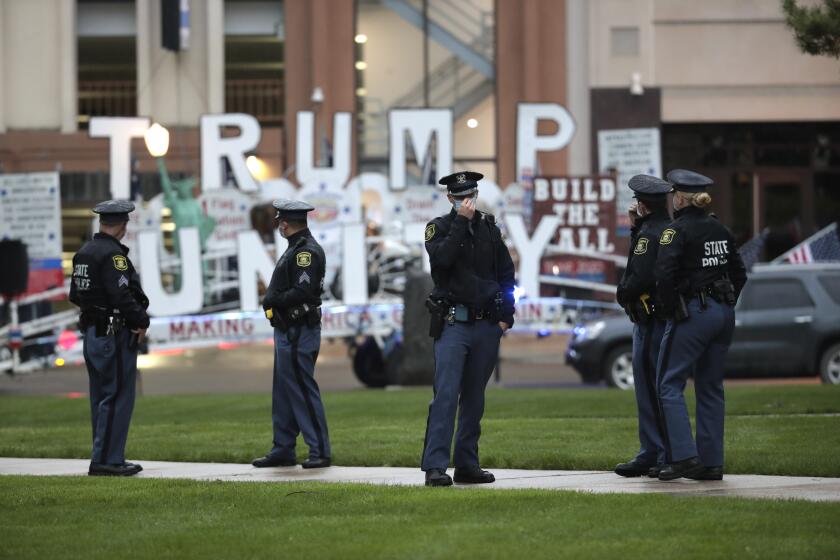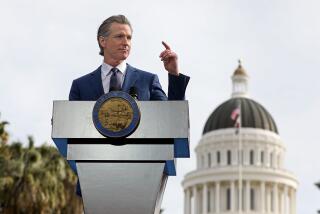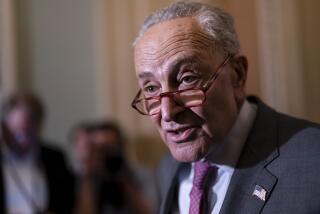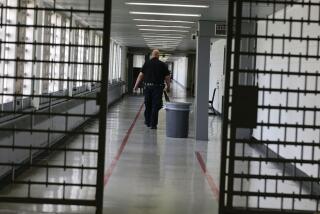Governors across U.S. face tough choices as coronavirus takes its toll on state budgets
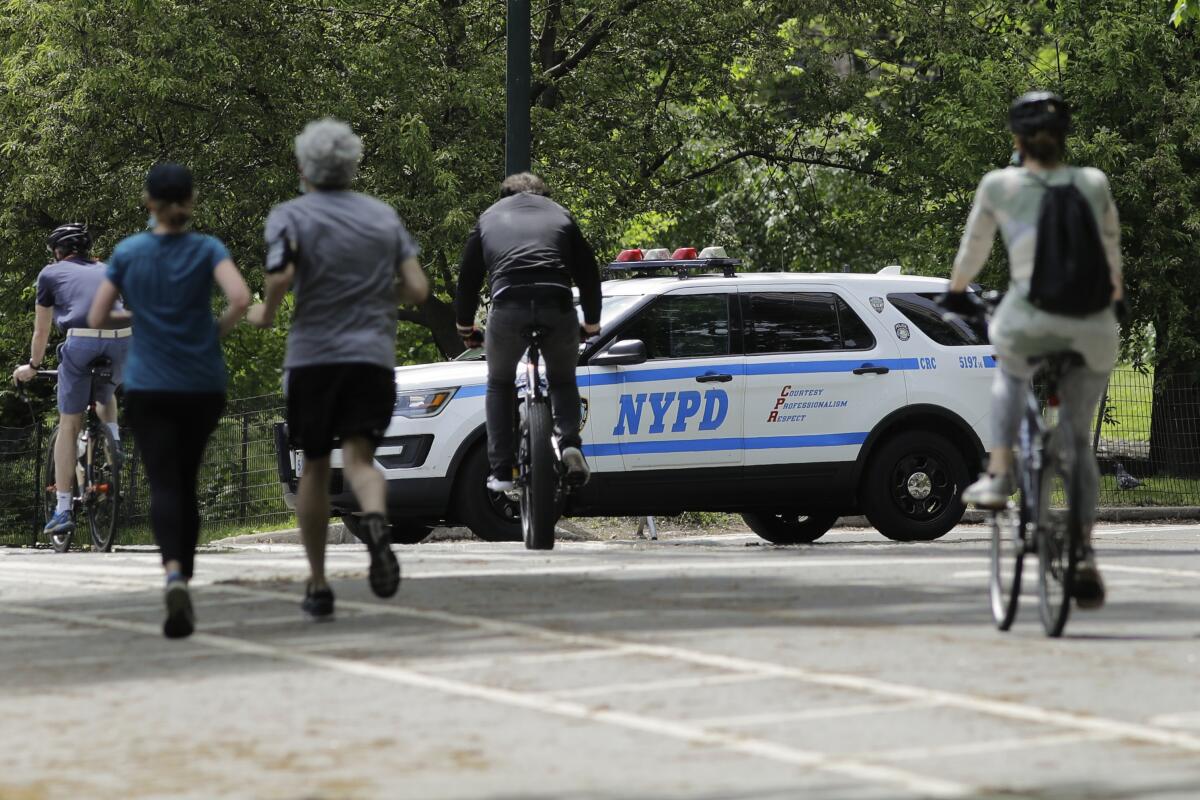
New York Gov. Andrew Cuomo urged the federal government Saturday to put politics aside and focus on providing funding for state governments that face growing deficits prompted by the coronavirus outbreak.
“If Washington does not make up that shortfall, there will be cuts. Do your job and help the American people! No delay, no special interests and no corporate bailouts,” Cuomo said Saturday.
The $3-trillion coronavirus relief bill approved by a Democratic majority in the House of Representatives on Friday would deliver almost $1 trillion in aid for state and local governments. About half of it would be in flexible funding to states.
But President Trump and fellow Republicans, who control the Senate, oppose the economic stimulus package, meaning it will almost certainly be rejected in its current form.
As the U.S. death toll in the coronavirus outbreak surpasses 85,000, Republican lawmakers are pushing Democratic governors to quickly ease restrictions.
Meanwhile, governors across the nation, including those in California, Colorado, Michigan and New York, are now having to figure out which services to cut or scale back as a result of skyrocketing deficits.
From education and health services to infrastructure spending, the ripple effect is likely to affect millions of people who have come to lean on such public services.
Cuomo said New York is facing a $61-billion budget shortfall, which could affect funding for schools, hospitals and police and firefighting departments.
“We have a significant economic problem in this state. I’ve made it clear how important it is,” Cuomo said Saturday.
Faced with a $54.3-billion deficit in California, Gov. Gavin Newsom proposed trimming the budget of the state prison system when he sent a revised spending plan to state lawmakers.
Newsom is asking, among other things, to close two state prisons in the coming years and eventually close all three state-run juvenile prisons. He also suggests scaling back parole from five years to two and cutting eight of the state’s 43 inmate firefighter camps.
Some Democratic governors face mounting pressure from Trump and other Republicans over the pace of lifting stay-at-home measures. As that debate intensifies, Cuomo raised concern Saturday that GOP lawmakers will favor Republican-leaning states when it comes to providing economic relief.
“Let’s put the politics aside,” Cuomo said. “For senators to be talking about, ‘I’m not going to bail out blue states because the blue states have more coronavirus cases,’ shame on you.”
Michigan Gov. Gretchen Whitmer, a Democrat who was sued by the GOP-controlled state House and Senate over claims that she had overstepped her authority by extending the state’s stay-at-home orders, is facing $2.6 billion in state budget cuts, according to a state economic and budget review report released this week.
On Wednesday, Republican state Sen. Wayne Schmidt said that Michigan “can’t count on what the federal government is going to do” and that as a result of the economic fallout from the outbreak, K-12 schools could lose up to 25% in state funding.
“We’ve been doing damage in such a short period of time. It’s not the governor’s fault or the Legislature. This is just this coronavirus has devastated our economy,” Schmidt told WXMI-TV in Grand Rapids.
Many states had already frozen spending and furloughed workers. But with economic relief from the federal government stalled for the time being, tough choices await state and local government officials.
In Colorado, the coronavirus-led economic decline has resulted in an estimated $3.3-billion shortfall in revenue for the current fiscal year, according to a report by the Colorado Legislative Council Staff. Initiatives that Coloradans had come to rely on, such as affordable housing and mental health services, are now at risk.
Meanwhile, as the death toll from COVID-19 continues to climb, some officials are doubling down on enforcing social distancing and quarantining measures to help slow the spread of the virus.
In Hawaii, a 23-year-old man from New York was arrested Friday after violating mandatory 14-day quarantine rules.
Officials became aware of the visitor, Tarique Peters, violating the rules after numerous pictures were posted on his social media accounts of him walking on the beach and sunbathing. He was arrested five days after arriving in Hawaii.
“We appreciate the assistance of local people who spot flagrant violations of our emergency rules on various social media sites and report them to the appropriate authorities,” said Hawaii Atty. Gen. Clare Connors in a statement.
More than 88,700 people in the U.S. had died of COVID-19 as of late Saturday afternoon, according to Johns Hopkins University statistics. More than 1.4 million people have tested positive, according to the university’s data.
The outbreaks in nursing homes across the U.S. have been particularly devastating. According to data compiled by the Associated Press, more than 26,000 people who reside or work in nursing homes and long-term care facilities across the country have died.
As officials seek to control the outbreaks in nursing homes and long-term care facilities, some states that have begun to partially reopen, including New York, Arizona, Delaware and New Jersey, are expanding coronavirus testing to residents and staffers of such facilities.
On Monday, Texas Gov. Greg Abbott joined the ranks of governors ordering all nursing home residents and staff to be tested.
Several states including hard-hit New York began allowing a slow reopening Friday. In New York, it extended to five regions upstate.
Curbside or in-store pickups resumed at retail stores as well as construction and agricultural operations. The decision to reopen came after those areas met benchmarks set by public health experts.
“Even as we reopen, we have to remain vigilant. What happens depends on what we do. How you act will determine what happens to you. Will we have a higher infection rate? Depends on what we do. You increase economic activity and we expect to see an increase in numbers,” Cuomo said Saturday.
In North Dakota on Friday, Gov. Doug Burgum released guidelines for how large venues, such as event arenas and sport stadiums, can reopen.
Protocols include “a limit on capacity to a percentage of normal operating capacity,” alternate rows of chairs and bleachers between patrons, tables seating no more than 10 people and floor plans to accommodate social distancing.
Washington Gov. Jay Inslee walked back a reopening guidance protocol Friday that called for businesses to maintain a list of names of patrons who dined in their facilities, after facing backlash from constituents and restaurant owners.
Instead of businesses being required to take the information, Inslee said in a statement Friday evening, the state will be asking businesses and patrons to provide it on a voluntary basis.
“We are asking visitors to voluntarily provide contact information in case of COVID-19 exposure. We only need information for one person per household. If we learn you may have been exposed to COVID-19 during your visit, the information will only be shared with public health officials,” Inslee’s news release said.
“They will contact you to explain the risk, answer questions and provide resources. This information will not be used for any other purpose, including sales or marketing. If this list is not used within 30 days, it will be destroyed.”
The Associated Press contributed to this report.
More to Read
Start your day right
Sign up for Essential California for news, features and recommendations from the L.A. Times and beyond in your inbox six days a week.
You may occasionally receive promotional content from the Los Angeles Times.
